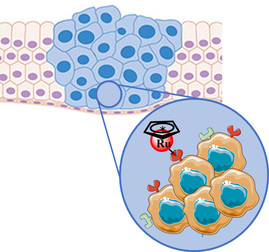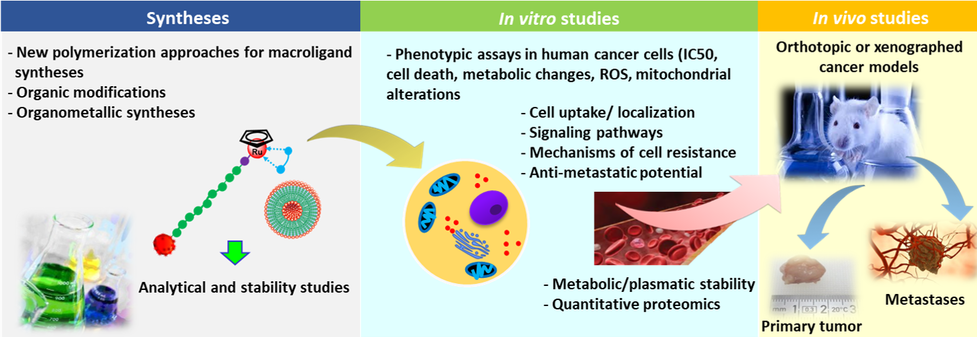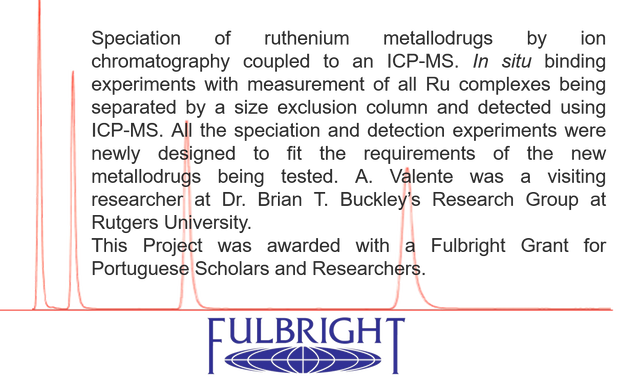"Fighting metastatic cancers: prime time for ruthenium"
“Fighting metastatic cancers: prime time for ruthenium” constitutes a key contribution to the field of cancer chemotherapy through the search of new alternatives presenting higher selectivity and efficiency towards tumor cells than the existing drugs in clinical use. Specifically, Lead4Target wants to address a relevant clinical problem through the development of new wide range actin-targeting agents to treat primary cancers and their metastases. Colorectal cancer (CRC), the 3rd most killing cancer, was chosen as the cancer model for this project since no specific effective drugs are available so far for targeting CRC with specific genetic profile.
The main innovation presented here is the use of multi-target compounds (‘RuCp-PMC’) that present several attractive features as anticancer agents: i) stability; ii) extraordinary cytotoxicity imparted by the ruthenium cyclopentadienyl core; iii) selectivity to cancer cells, driven by the inclusion of bio(co)polymer comprising a specific target vector (biomolecule) recognized by cancer cells; iv) anti-metastatic behavior caused by structural alterations in cytoskeleton (F-actin filaments) and v) inhibition of CRC related kinases.
Project financed by FCT (PTDC/QUI-QIN/28662/2017) - ongoing.
The main innovation presented here is the use of multi-target compounds (‘RuCp-PMC’) that present several attractive features as anticancer agents: i) stability; ii) extraordinary cytotoxicity imparted by the ruthenium cyclopentadienyl core; iii) selectivity to cancer cells, driven by the inclusion of bio(co)polymer comprising a specific target vector (biomolecule) recognized by cancer cells; iv) anti-metastatic behavior caused by structural alterations in cytoskeleton (F-actin filaments) and v) inhibition of CRC related kinases.
Project financed by FCT (PTDC/QUI-QIN/28662/2017) - ongoing.
“Polymer-Ruthenium Complexes for targeted drug delivery: a new approach to fight cancer”
This project aims to contribute to the chemotherapy field through the search of new alternatives presenting higher selectivity and efficiency towards tumour cells than the actual drugs. The prohibitive death numbers of cancer patients show the pertinence of this area and the urgency to find more potent and selective drugs. In this frame, Polymer-Metal Complexes (PMCs) provide potential tools to surmount many of the current limitations in conventional chemotherapy. The main innovation here is the use of our new emerging Ru compounds, already recognized as efficient cancer cell killers, to charge our polymers. Importantly, our polymers include specific target vectors to efficiently reach the cancer cells aiming to considerably improve the chemotherapeutic efficacy.
Cancer therapy is a multidisciplinary challenge demanding close collaboration among clinicians, biological, chemical, biochemical and material scientists. This project has gathered expertise in all these areas and PMC can potentially be seen as efficient drug-delivery systems in order to shorten the gap between drug discovery and drug delivery.
This Project of funded by FCT (IF/01302/2013) - ongoing
Cancer therapy is a multidisciplinary challenge demanding close collaboration among clinicians, biological, chemical, biochemical and material scientists. This project has gathered expertise in all these areas and PMC can potentially be seen as efficient drug-delivery systems in order to shorten the gap between drug discovery and drug delivery.
This Project of funded by FCT (IF/01302/2013) - ongoing

“Multifunctional polymer-metal complexes: an innovative approach to treat cancer”
This project intends to give a decisive contribution for the issue of efficient drug delivery. For this, the new multifunctional polymer-metal complexes are designed to present the following features: i) a tumour-specific biomolecule in the polymeric chain; and ii) Ru or Fe cyclopentadienyl derivatives, which high cytotoxicity activity has been already revealed by our previous studies (higher in vitro activity than cisplatin in a wide range of tumour cell lines and a significant antiproliferative effect on metastatic cell lines, contrarily to Pt drugs; higher efficiency for a wider range of tumour cells than the Ru(III)compounds, NAMI-A and KP1019, in current clinical trials).
This Project was funded by Royal Society of Chemistry (RSC Research Fund Grant).
This project intends to give a decisive contribution for the issue of efficient drug delivery. For this, the new multifunctional polymer-metal complexes are designed to present the following features: i) a tumour-specific biomolecule in the polymeric chain; and ii) Ru or Fe cyclopentadienyl derivatives, which high cytotoxicity activity has been already revealed by our previous studies (higher in vitro activity than cisplatin in a wide range of tumour cell lines and a significant antiproliferative effect on metastatic cell lines, contrarily to Pt drugs; higher efficiency for a wider range of tumour cells than the Ru(III)compounds, NAMI-A and KP1019, in current clinical trials).
This Project was funded by Royal Society of Chemistry (RSC Research Fund Grant).




